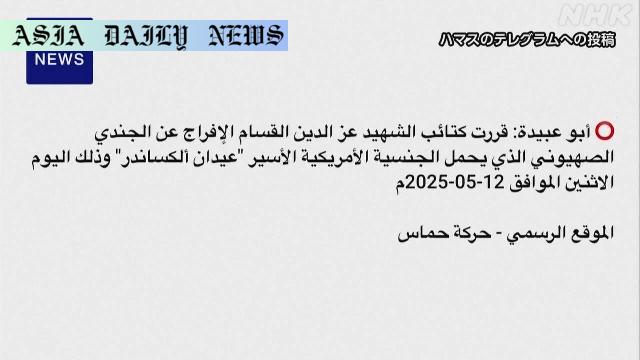Hostage: Hamas to release an American-Israeli held in Gaza as part of ongoing discussions for peace and aid relief efforts.
- Hamas has announced plans to release an American-Israeli hostage held in Gaza.
- This decision is part of broader efforts aimed at ceasefire discussions.
- US Special Envoy Steve Witkoff is due to arrive in Israel on Monday.
- President Trump calls the announcement a ‘good faith step’ for peace.

Hamas Announces the Release of American-Israeli Hostage
The Islamic group Hamas has made a significant announcement, declaring its intention to release an American-Israeli hostage held in the Gaza Strip. This development comes amidst ongoing discussions aimed at achieving peace and alleviating the humanitarian crisis in the region. The intended release signals a noteworthy step in international efforts to de-escalate tensions and foster goodwill between the conflicting parties. According to Hamas, the release is scheduled for Monday, following high-level negotiations involving the United States, Egypt, and Qatar.
High-Stakes Negotiations for Peace
The decision to release the hostage comes after crucial talks facilitated by several intermediaries, underscoring the importance of diplomacy in times of conflict. With an estimated fifty-nine hostages still in captivity, Hamas’s willingness to release one individual is seen as part of broader efforts to work toward a ceasefire. Hamas has indicated that their actions are aimed at enabling the entry of essential aid and relief supplies into Gaza, a region severely affected by ongoing hostilities and blockades. While it is just one release, it signifies a potential turning point in a fraught and volatile situation.
International Response and Implications
United States President Donald Trump responded positively to the announcement, lauding it as a “step taken in good faith.” Trump’s acknowledgment reflects the significance of this release on the global stage. Furthermore, US Special Envoy to the Middle East, Steve Witkoff, is expected to arrive in Israel on Monday to further discuss strategies for peace. Trump’s upcoming visit to Saudi Arabia and other Middle Eastern countries, set for Tuesday, may play a critical role in fostering continued dialogue and seeking long-term solutions to the conflict. Both Qatar and Egypt’s involvement in the negotiations also highlights their growing diplomatic influence in mediating Middle Eastern disputes.
Broader Context: Conflict and Humanitarian Crisis
The release announcement sheds light on the dire circumstances in Gaza, where millions of people are enduring the fallout from the ongoing conflict. Humanitarian aid, including food and medical supplies, remains critical for the survival of many. The decision by Hamas to release a hostage is not only a gesture toward peace but also one that will potentially facilitate the entry of much-needed relief resources into the region. This development highlights the urgent need for continued negotiations and international support to address the underlying issues driving the prolonged conflict.
Looking Ahead: Path Toward Resolution
While the release of a single individual cannot resolve the broader conflict, it serves as an encouraging signal that dialogue and diplomacy still hold promise. The involvement of international mediators such as Qatar and Egypt underscores the importance of multilateral engagement in achieving stability in the Middle East. As President Trump prepares for his visit to the region, there is cautious optimism that such diplomatic efforts will yield further progress, potentially paving the way for a lasting resolution. In the meantime, all eyes will be on how Monday’s release unfolds and whether it marks the start of a new chapter in the pursuit of peace.



Commentary
The Importance of Diplomatic Efforts in Conflict Resolution
The planned release of an American-Israeli hostage from Gaza by Hamas is a significant development in the context of a deeply entrenched conflict. Such measures, though small in scale, can act as pivotal gestures in building trust between opposing parties. The role of intermediaries, in this case, Qatar and Egypt, underscores the power of diplomacy in mitigating hostilities. These nations have managed to navigate the complexities of the conflict, laying the groundwork for broader discussions around ceasefires and humanitarian relief efforts.
The Humanitarian Aspect of the Hostage Release
The ongoing crisis in Gaza has left millions of people grappling with severe shortages of necessary supplies. With food, medical assistance, and basic amenities in scarce supply, the potential humanitarian access facilitated by such overtures from Hamas cannot be overstated. The release of the hostage is more than just an act of goodwill—it is symbolic of a potential shift toward addressing the stark humanitarian realities that the people of Gaza are facing. International stakeholders, whether governmental or non-governmental entities, must leverage such openings to provide aid and relief to those who need it most.
Cautious Optimism for a Fragile Peace
While this release represents a positive step, it is crucial to approach the situation with measured optimism. The complexities of the Israeli-Palestinian conflict have brought numerous false starts and dashed hopes over the decades. However, this moment—amidst the apparent willingness of Hamas, and with significant involvement from international actors—presents a unique opportunity. As global leaders like President Trump engage in diplomatic outreach across the Middle East, there is a sliver of hope that dialogue can replace discord. The road to peace is long, but even a single step in the right direction is a step worth celebrating.